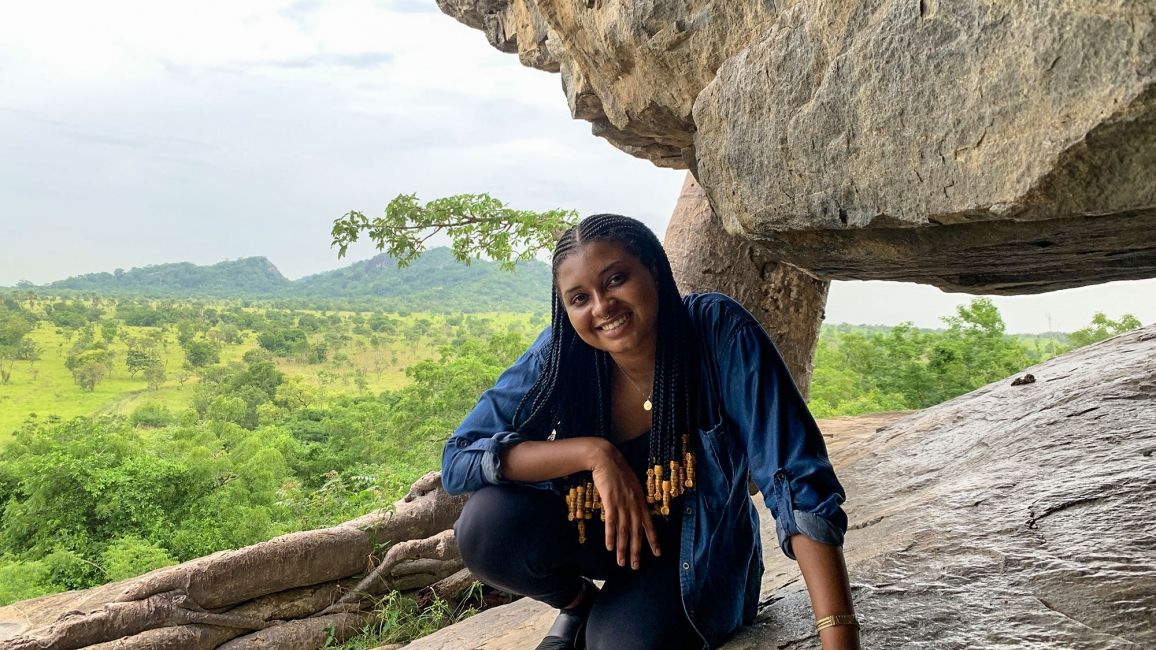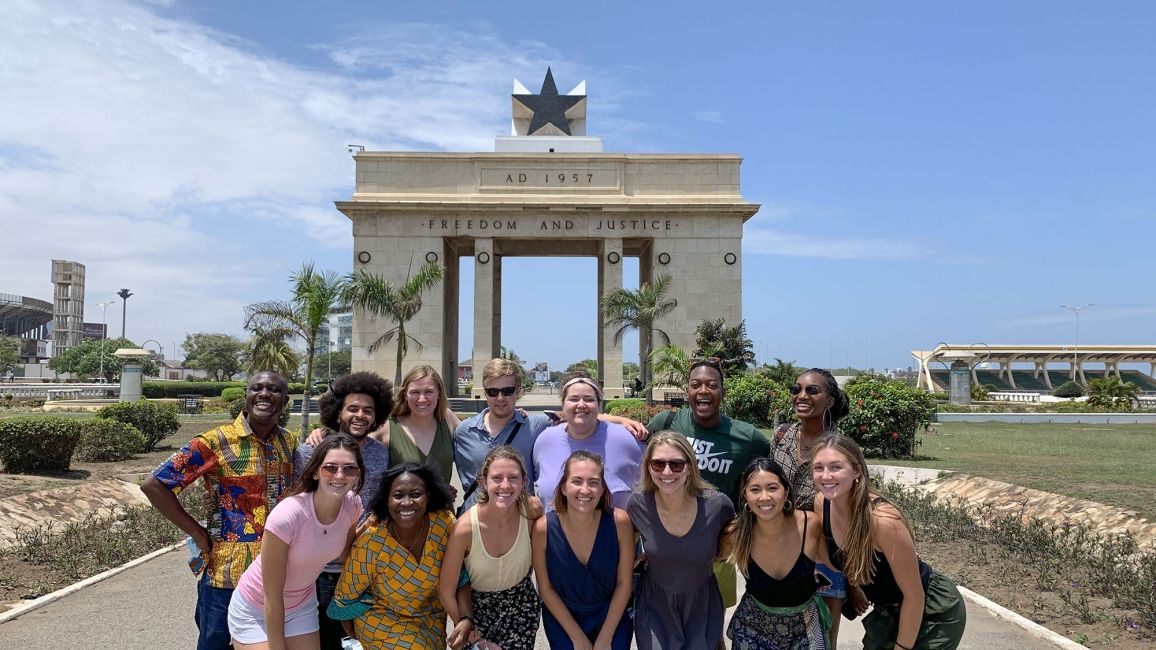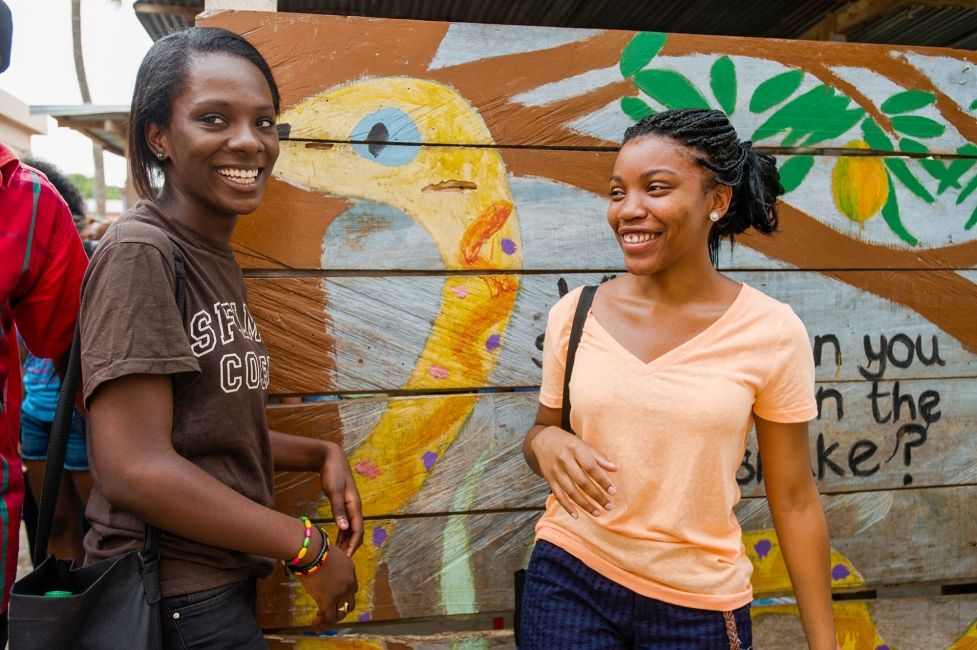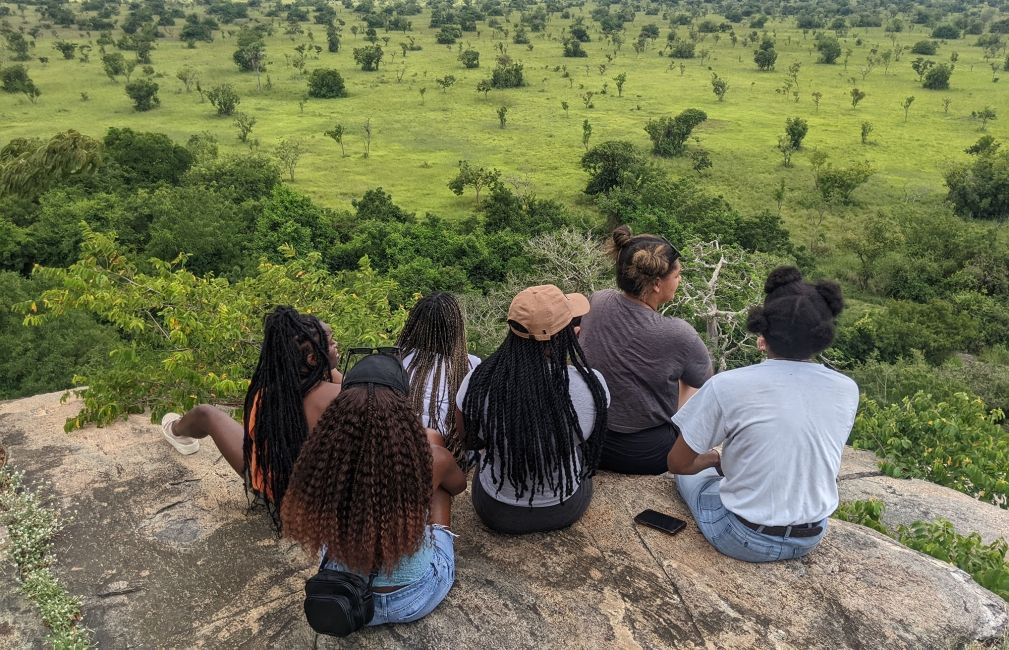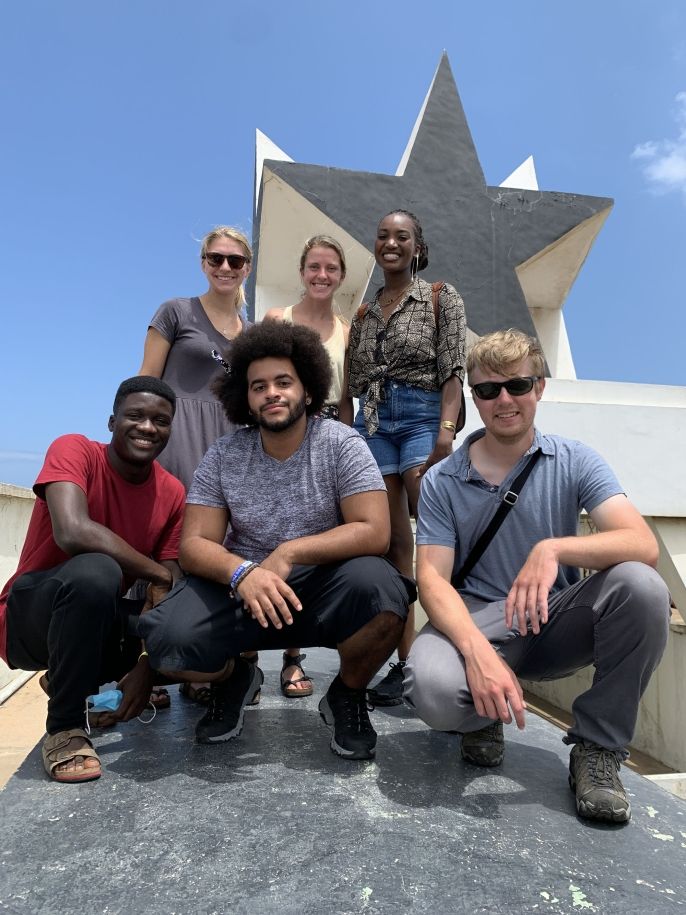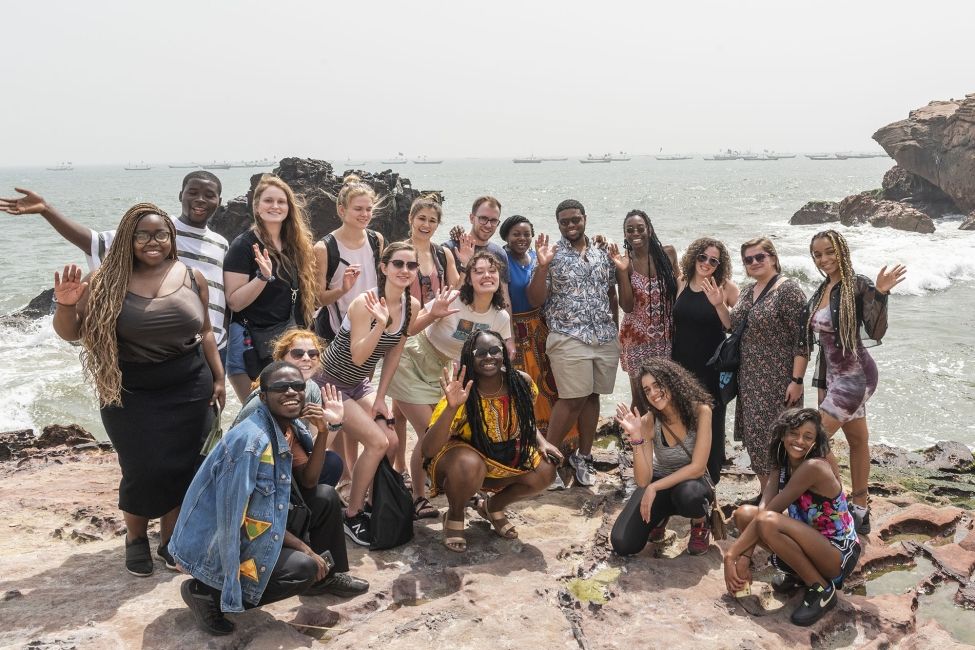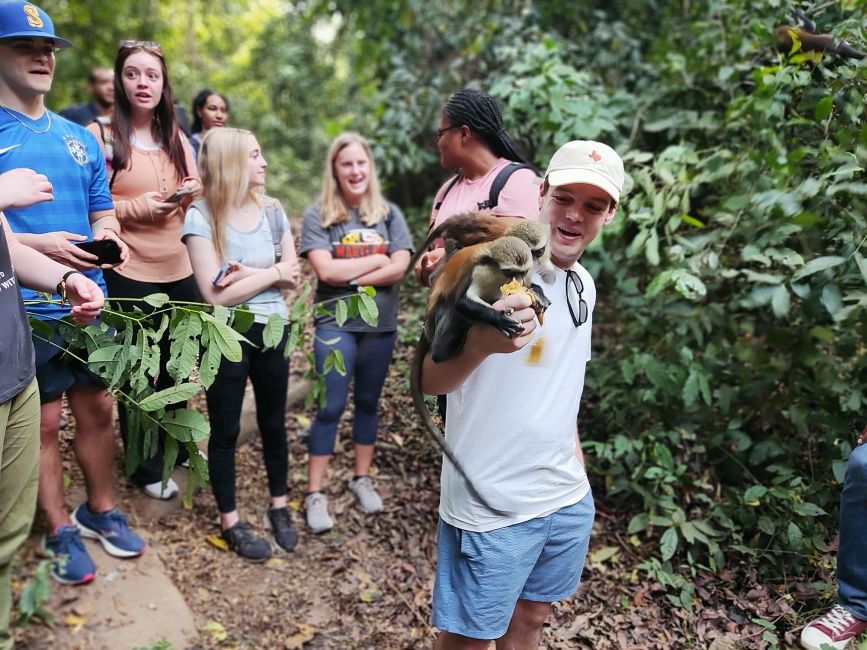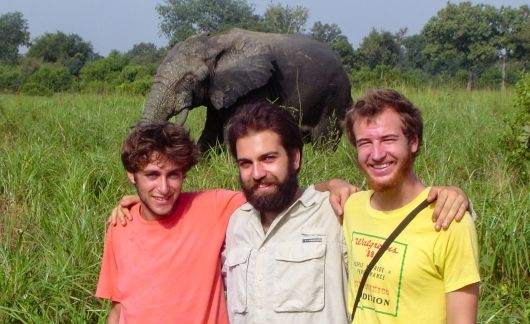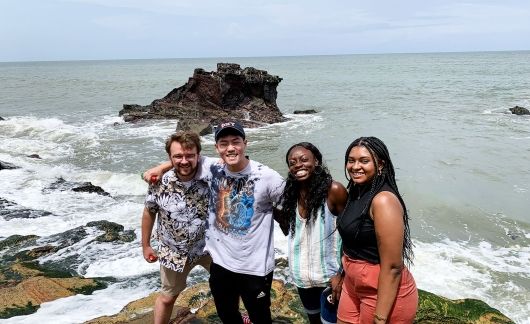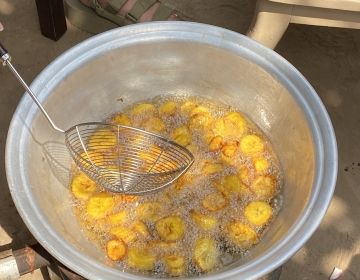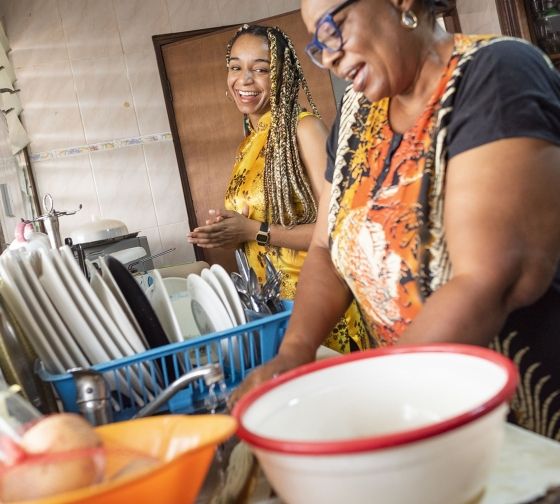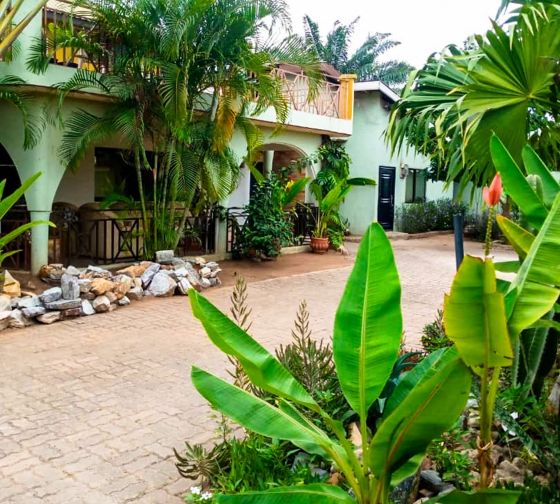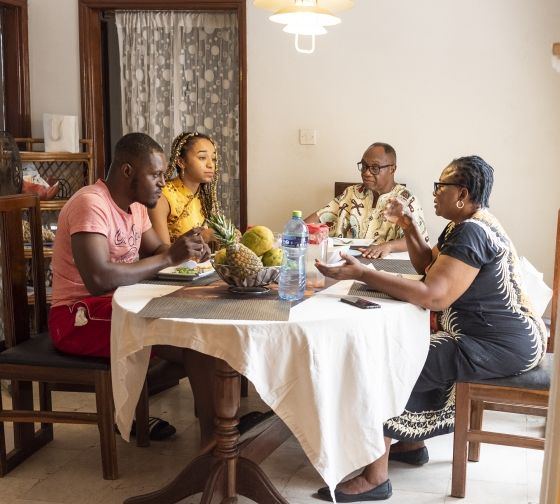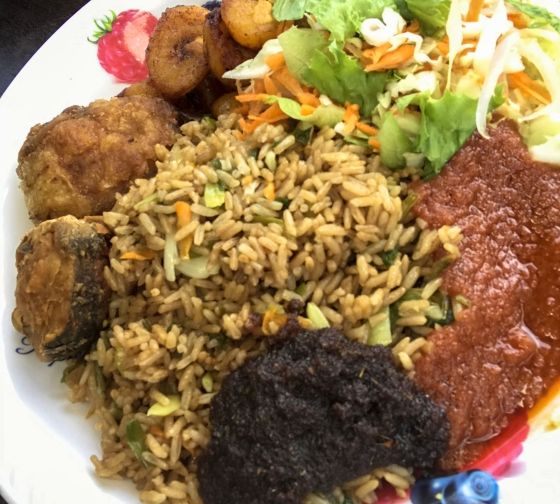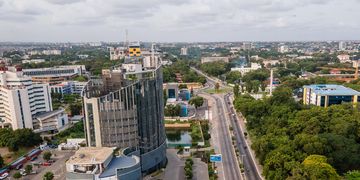
Arts + Sciences
Unique Experiences
Learn about West Africa
outside of the classroom by living with a Ghanaian family or in on-campus housing, volunteering, interning, and observing day-to-day life.
Take classes
at the University of Ghana - ranked 7th best university in Africa - in humanities, basic and applied sciences, education, and health sciences.
Explore beyond Legon
with field trips and excursions around this equatorial region.
7.5
miles from Accra, Ghana’s capital city
53 K
students at University of Ghana
3
degrees north of the equator
Your Destination
Legon’s well-educated citizens welcome other international students with open arms to their quiet suburban town, just northeast of the city center in the Accra Metropolis District. The sprawling University of Ghana campus is ranked as the 1st in West Africa and 15th in Africa.
Students also enjoy access to a large shopping mall and several grocery stores, as well as restaurants and bars. Beyond campus, the equatorial region includes full of rainforests, wildlife parks, and beaches to explore.
The Culture
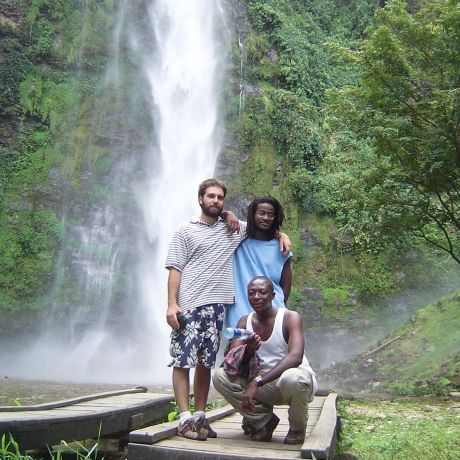
Excursions & Activities
- Travel to Cape Coast and Elmina to see slave castles and the starting point of the Ttransatlantic journey.
- Visit the Ashanti region to explore the traditional chieftaincy institution, history, and culture as well as the role women play in the making and unmaking of chiefs among the Ashanti people.
- Experience regional highlights like Aburi Botanical Gardens, Tetteh Quarshie Cocoa Farm, Boti Falls, Kwame Nkrumah Mausoleum, Lake Volta, Tafi-Atome monkey sanctuary, and the W.E.B. Dubois Center.
- Get involved on- campus by joining a music, theater, or art group, or meeting up with Ghanaian students for soccer, running, swimming, field hockey, or tennis. Basketball and baseball are also getting popular.
- Take advantage of campus lectures, discussions, and receptions.
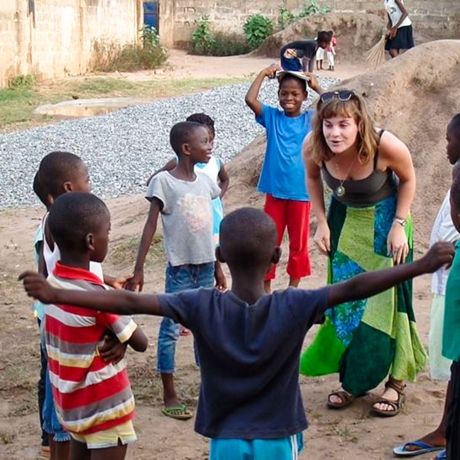
Projects
Volunteering. Get involved with local Ghanaians through service work. Volunteer at after-school programs such as the Play and Learn Foundation, an orphanage, an environmental NGO, an educational NGO, or similar organizations.
Community Service. Join other CIEE students for a group-service project, like painting, tree planting, mentoring kids at an orphanage and providing tutorials in basic Math and English, teaching IT skills, collecting donations, or building water filtration systems.
Community Engagement. Immerse yourself in the Ghanaian culture while giving back to your host community. In the past, students have volunteered at daycare centers, elementary and junior high schools, taught computer literacy, coached soccer, and mentored disadvantaged youth. CIEE Legon also undertakes community service every semester. Past projects have included painting, weeding, cleaning a special needs center, collecting donations of clothing items, and building a water filtering system for a village.
Peer Support. Have the support of a U-Pal – a CIEE-trained University of Ghana student who will help you get settled and connected in Legon socially and academically.
Internships. Gain important real-world experience and academic credit by pursuing an internship. Opportunities include shadowing doctors and nurses during ward rounds at the West Africa AIDS Foundation and International Health Care Center; teaching English or math and mentoring children at the Future Leaders Underprivileged Care Center; assisting with research and advocacy governance think tanks like the Ghana Anti-Corruption Coalition and Ghana Integrity Initiative, or working alongside entrepreneurs in various fields of business and social enterprises.
Have a look at some for-credit internship options:
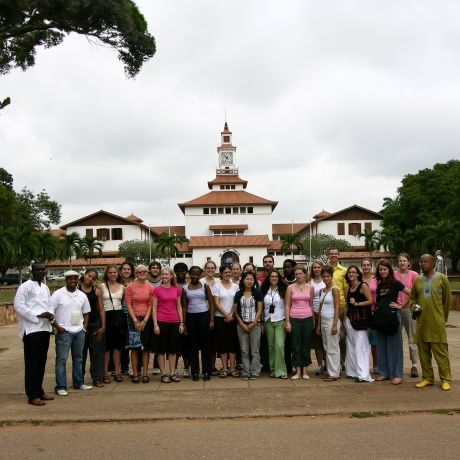
Directed Independent Research
Receive supervision from local professors while you embark on independent research. Over the years, some areas that have been independently researched and successfully supervised are HIV/AIDs in collaboration with Noguchi Memorial Institute for Medical Reseach, Post-Colonial Ghanaian Literature, African Religion, Haitian History, Marine Biology, and Economics. At the end of the course, there is an opportunity to present your findings before a group of local experts.
Program Blogs
Exploring Ghanaian Cuisine!
When people asked what I was most excited about when preparing for my semester abroad I replied with "dance, music, and food!" In regards to food specifically, I was looking... keep reading
Arrival In Accra, Ghana: First Impressions and Observations
Who let me book a solo flight to Ghana?! This is what I thought in the days leading up to my departure. I viewed the trip ahead with much anticipation... keep reading
One Village, One History, One Craft
Vume is a small town in the Volta Region of Ghana, which is known for the art of clay pottery. When the craft was introduced, the people of Vume were... keep reading
Housing & Meals
Housing
CIEE Legon offers various housing options, which include homestays, off-campus hostel, and off-campus apartment-style housing. Housing options are located around the Legon campus, with convenient access to downtown Accra (roughly 60 minutes drive) but are close to the CIEE Legon study center on campus (30 to 45 minutes drive).
Standard Housing: Includes a single/double room at a homestay or a triple or quad-room at an off-campus hostel located within a 30-minute drive from CIEE Legon. (Estimate an additional 15-30 minutes commute time when traffic is heavy or there is difficulty in getting public transport.) Homestays boast a kitchen, living room, and bathroom shared with a host family or bathroom ensuite rooms. The off-campus hostel offers triple or quad-occupancy en-suite rooms, with shared common spaces such as the fitted kitchen and 2 lounge areas.
Select Plus Housing: Includes a single-occupancy air-conditioned room in apartment-style housing off-campus, located within 20 minutes from CIEE Legon. (Estimate an additional 15-30 minutes commute time when traffic is heavy or there is difficulty in getting public transport.)
Select Plus housing requires an additional fee.
A note: The default criterion to assign housing is first-come, first-served; however, other factors may also be considered. If we cannot accommodate your first housing choice, we'll let you know before you arrive. Non-standard housing options require an additional fee that can be found in the program Dates and Fees.
Meals
Homestay: Hosts provide breakfast and dinner during the week, and students get lunch on their own. Hosts provide all three meals on weekends.
Hostels/Apartment-style Housing: Meals are not included. Students prepare meals (facilities are limited) or eat on or off campus from the myriad of food places available.
Academics
The University of Ghana (UG) is the oldest, most diverse campus community and largest university in the country. UG welcomes more than 53,000 students from more than 87 countries and about 1,250 faculty members from 22 countries. Programs include agriculture (featuring three research stations), consumer sciences, economics, computer science, engineering, performing arts, law, medicine, natural sciences, social sciences, business, nursing, public health, African studies, international relations, mathematics, journalism and communication, population studies, statistical research, social research, and economic research. The university follows a British model, which is less structured and requires students to take more responsibility and initiative. Professors expect students to spend significant time studying outside of class.
CIEE Legon taught courses are augmented with co-curricular experiential learning experiences. These may include site visits to relevant landmarks or locations in Ghana that illustrate contents explored during class sessions or hear from relevant guest speakers who will bring their expertise to show students a different cultural, academic, and professional perspective.
Arizona State University: Enhance your international academic coursework with optional online courses that best align with your degree requirements and interests. ASU offers thousands of online courses in asynchronous sessions that fit within the CIEE academic calendar, so you can study abroad with CIEE while continuing to meet all your academic goals.
Course Information
Students should review their academic plan with their academic advisor before departure. Students will select their courses upon arrival.
In the Fall term, odd-numbered courses are offered, and in the Spring term, even-numbered courses are offered*.
- First-year courses are odd numbered from 100-199.
- Second-year courses are numbered from 200-299.
- Third-year courses are numbered from 300-399.
- Fourth-year courses are numbered from 400-499.
Academic Projects
Communication, Journalism, and Media
Health Professions and Related Programs
History, Philosophy, Religion
Social Sciences
Visual and Performing Arts
Academic Projects
Communication, Journalism, and Media
Health Professions and Related Programs
History, Philosophy, Religion
Social Sciences
Visual and Performing Arts
University of Ghana (UG)
The University of Ghana offers courses in Humanities and Social Sciences, Basic and Applied Sciences, Mathematical and Engineering Sciences, and Performing Arts. The institution’s STEM focus is on Computer Engineering, Food Process Engineering, Material Science and Engineering, Agricultural Engineering, and Biomedical Engineering. Other areas are cell and Molecular Biology, Oceanography, and Marine and Fisheries Sciences.
Use the University of Ghana’s handbooks to navigate to schools or departments of interest and check out the undergraduate course lists.
College of Humanities
Business School
School of Law
School of Arts
School of Languages
School of Social Sciences
School of Performing Arts
College of Basic and Applied Sciences
School of Physical and Mathematical Sciences
School of Biological Sciences
School of Agriculture
School of Engineering Sciences
School of Veterinary Medicine
College of Health Sciences
School of Nursing
School of Pharmacy
School of Public Health
College of Education
School of Information and Communication Studies
School of Education and Leadership
Not all courses listed are offered every semester, some courses have prerequisites, and courses are subject to change.
CIEE proudly partners with ASU to deliver asynchronous, online coursework that aligns with your degree requirements from anywhere you study abroad.
CIEE and ASU offer courses online per program eligibility, at no additional charge. Be sure to review online courses with your home school advisor.
Check the CIEE Program Dates and ASU start dates below to maximize course options within your program!
Search ASU Online Courses BROWSE FAQs for more INFO
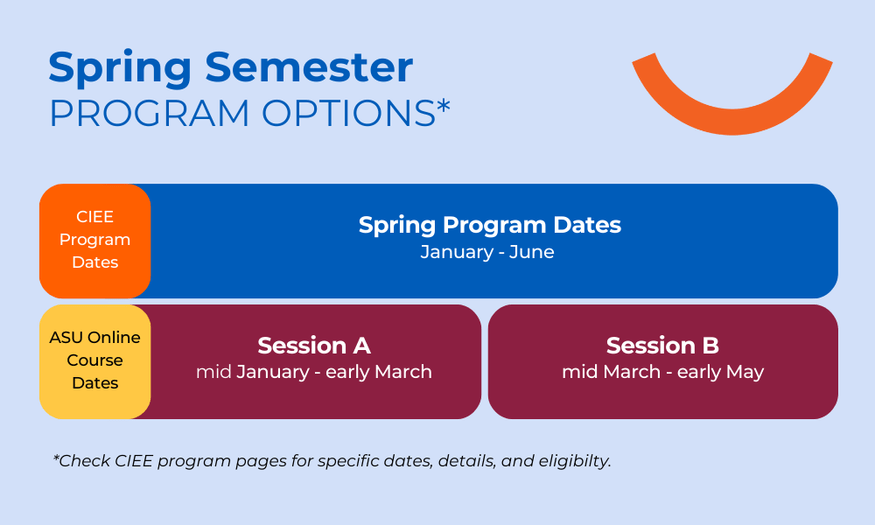
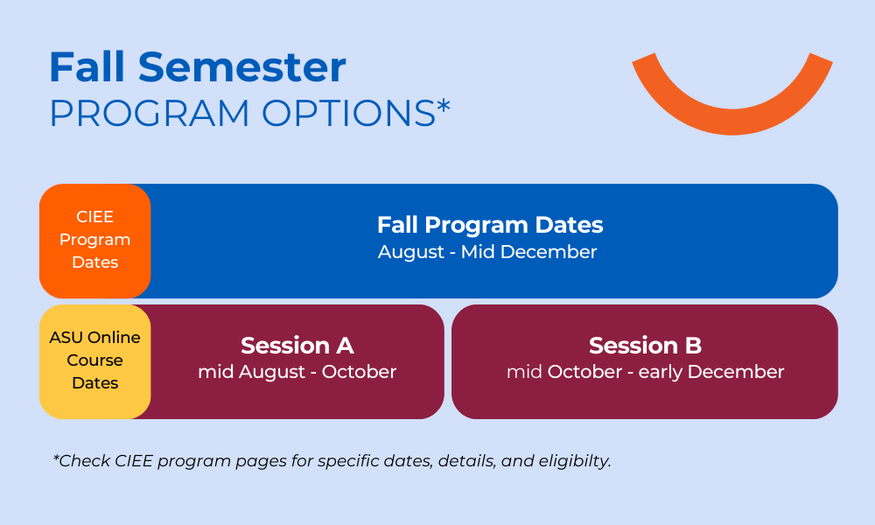
Note: This course listing is for informational purposes only and does not constitute a contract between CIEE and any applicant, student, institution, or other party. The courses, as described, may be subject to change as a result of ongoing curricular revisions, assignment of lecturers and teaching staff, and program development. Courses may be canceled due to insufficient enrollment.
"(GI)" denotes courses that originated at CIEE's Global Institutes and that are offered at multiple CIEE sites.
Discover Internship Opportunities
We're excited you're considering this program! Next, explore the types of internships you can choose from for an epic internship abroad with CIEE Study Abroad.
Explore Industry Options
Ghana's work scene is vibrant and diverse, driven by a growing creative economy in the arts and traditional sectors like trade and services. It reflects a dynamic blend of innovation and cultural heritage, making it a hub across various fields.
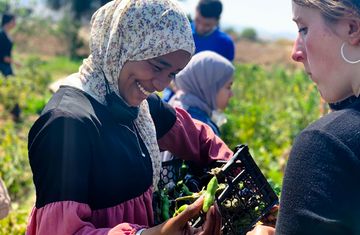
Agriculture, Food and Natural Resources
Gain experience in agricultural markets, agribusiness companies, and NGOs to study food production and global processes.
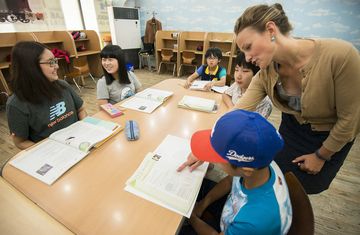
Education and Training
Experience international teaching methodologies and curriculum development in classrooms around Jordan, Spain, and more.

Health Science
Immerse yourself in global healthcare systems to study cross-border medical practices and address public health challenges.
Browse Internship Opportunities
Explore internship placements available through this program to find the right fit for your academic and professional goals.
Disclaimer: Internship placements are subject to availability and host employer hiring discretion. Application and payment of CIEE fees does not guarantee specific placement. This internship listing is for informational purposes only and does not constitute a contract between CIEE and any applicant, student, institution, or other party.
Scholarships & Grants
CIEE offers scholarships and grants annually to help students like you make your study abroad dream a reality.
Students who apply to this program are eligible for the following scholarships and grants:
- Wollitzer Merit Scholarships in Area or Comparative Studies
- Ping Scholarships for Academic Excellence
- Global Access Initiative (GAIN) Grants
- Stohl International Undergraduate Research Scholarships
- CIEE Gilman Go Global Grant
- MSI Grant
To be considered, submit the CIEE Scholarships & Grants application within your CIEE program application.
Dates & Fees
You get more for every dollar when you study abroad with CIEE, because our high-quality programs include everything from excursions to insurance. There are no hidden charges, and no disappointing surprises when you arrive.
Program |
Application Due |
Start Date |
End Date |
Fees & Housing |
|---|---|---|---|---|
| Program Fall 2025 13 weeks | Start Date * | End Date * | Fees & Housing $19,950 | |
| Program Academic year 2025-2026 32 weeks | Start Date * | End Date * | ||
| Program Spring 2026 16 weeks | Start Date * | End Date * |
*Dates for this program are provided as tentative dates. Please consult with your study abroad advisor to confirm dates before purchasing your flights.
To help you budget, keep in mind that students are responsible for the cost of international airfare, local transportation, books and supplies, visas, and personal expenses. In addition, your college or university may charge additional fees for study abroad, or may require you to receive a transcript via CIEE's School of Record, which carries an additional fee of $500.
Program Fees
CIEE offers the most student support of any provider in its program fee, including an airport greeting, full-time leadership and support, orientation, cultural activities, local excursions, pre-departure advising, and CIEE iNext travel protection with benefits.
| Participation Confirmation | $300 * |
| Educational Costs | $15,206 ** |
| Housing | $4,250 *** |
| Insurance | $194 |
| Total Fees | $19,950 |
Optional Housing
CIEE accommodation options are detailed in the Housing section. Based on availability, Select or Select Plus Housing can be chosen during the application process for an additional fee. Housing is assigned on a first-come, first-served basis; however, other factors may also be considered.
| Select Plus Housing Fee | $2,400 |
Financial Aid
CIEE offers the most grants and scholarships of any study abroad organization, including $8 million/year in travel grants, merit-based scholarships, institutional and MSI grants, and Gilman Go Global Grants.
Estimated Costs
Students are responsible and manage costs related to travel, meals, books, and personal expenses. Below are estimates for consideration.
| Meals not included in program fee | $420 † |
| International Airfare | $1,550 †† |
| Local Transportation | $700 |
| Books & Supplies | $150 |
| Visa Fees | $240 ††† |
| Personal expenses | $240 †††† |
| Other | $500 ††††† |
| Total Costs | $3,800 |
*non-refundable fee
**direct cost of education charged uniformly to all students
***Housing fees listed are for financial aid purposes only and should not be considered a basis for calculation of refunds.
†For students in homestays, families provide 2 meals a day and all weekend meals. For students in residence halls/hostels, you should budget approx. $340 per month for groceries if you plan on making your own meals, and more if you plan on eating out regularly.
††round-trip based on U.S. East Coast departure
†††Visa application in the US+non-citizen ID card
††††$100 emergency fund + cell phone expense + toiletries
†††††Yellow Fever Vaccination - All travelers must present a vaccination card upon entry to Ghana. Costs and insurance coverage may vary. CIEE recommends booking an appointment for the vaccine well in advance, as supplies are limited AND Covid test to return to the US. Travellers are also required to produce a negative COVID test result within 72 hours before boarding a flight to leave Ghana.
Program Fees
CIEE offers the most student support of any provider in its program fee, including an airport greeting, full-time leadership and support, orientation, cultural activities, local excursions, pre-departure advising, and CIEE iNext travel protection with benefits.
Financial Aid
CIEE offers the most grants and scholarships of any study abroad organization, including $8 million/year in travel grants, merit-based scholarships, institutional and MSI grants, and Gilman Go Global Grants.
Estimated Costs
Students are responsible and manage costs related to travel, meals, books, and personal expenses. Below are estimates for consideration.
Program Fees
CIEE offers the most student support of any provider in its program fee, including an airport greeting, full-time leadership and support, orientation, cultural activities, local excursions, pre-departure advising, and CIEE iNext travel protection with benefits.
Financial Aid
CIEE offers the most grants and scholarships of any study abroad organization, including $8 million/year in travel grants, merit-based scholarships, institutional and MSI grants, and Gilman Go Global Grants.
Estimated Costs
Students are responsible and manage costs related to travel, meals, books, and personal expenses. Below are estimates for consideration.
What's Included
Tuition
Housing
Pre-departure Advising
Advising before you depart to set goals and answer questions
Optional on-site airport meet-and-greet
Orientation
Introduction to your program plus practical information about living in your host city
On-site Staff
Full-time program leadership and support in your city
Cultural and/or Co-curricular Activities
Excursions and/or Study Tours
Travel Protection
CIEE iNext travel protection
24/7 emergency on-site support
Our Staff
Amma Appiah
Center Director
Amma is passionate about intercultural learning in international education and embraces the idea of empathetic study abroad management. As a person living with a chronic illness, Amma also dedicates time to raising awareness on autoimmune rheumatic diseases and advocates for persons living with such in Ghana.
Rachel Akata
Program Coordinator
Rachel supervises student life coordination at the center and assists the director with housing, internship, and volunteer placements.
Mike Adu Ampofo
Faculty and Custom Program Coordinator
Mike earned his bachelor's in Information Technology from Pentecost University in Ghana. He manages all custom and faculty-led groups that come on-site.
Mike Adu Ampofo
Faculty and Custom Program Coordinator
Mike earned his bachelor's in Information Technology from Pentecost University in Ghana. He manages all custom and faculty-led groups that come on-site.
Get Started
1
2
Connect With Your Campus Study Abroad Office
Share your plans and confirm you're on track to meet all required steps to go abroad.
3
Contact CIEE
We're here to help! Send us an email if you still have questions or need information about applying to this program.
4
Interested in an optional internship?
After being accepted to this program and submitting the required internship documents, work with CIEE staff on your internship goals and select which positions to interview for. CIEE will reach out to companies that would be a good fit for you, your interests, and your qualifications. Finalize your internship placement upon arrival!
